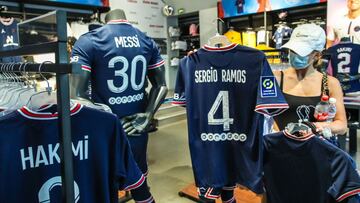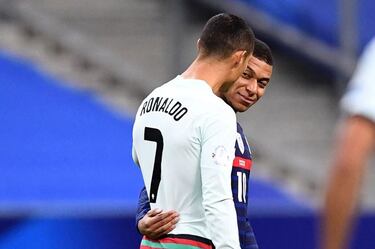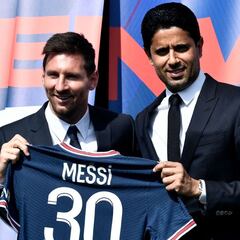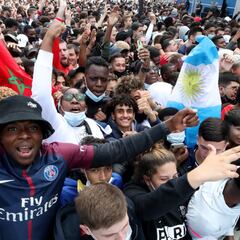What is the salary limit for Ligue 1?
PSG have taken advantage of FFP rules being relaxed and the economic effects of the covid crisis to pull off a sporting coup.

Football, and European football in particular, remains one of the last bastions of salary cap-free competition and the economic effects of the coronavirus pandemic will ensure that remains the case for a while at least. Two vastly differing approaches to the huge financial losses being incurred by Europe’s major leagues collided this week when Leo Messi left Barcelona after 21 years to join PSG: LaLiga has recently imposed salary restrictions to try and stem offset revenue losses while Ligue 1 has elected to postpone any advancement on that front to give struggling clubs a leg-up after the collapse of Mediapro and the subsequent loss of television revenue in the French top flight while Financial Fair Play constraints have temporarily been made less stringent.
In France, as in any league, some clubs are more equal than others and while PSG would scarcely be in danger of not making ends meet on a monthly basis like some of their competitors – overall losses for the 2020-21 season are estimated at around €1.3 billion - the relaxation of the rules has allowed the Parc des Princes board to pull off what will surely go down as one of the most remarkable transfer coups in the history of the game by luring Messi to Paris. Even without the arrival of the Argentina captain PSG had already done some remarkable business, acquiring the services of Sergio Ramos, Gianluigi Donnarumma, Achraf Hakimi and Georginio Wijnaldum, all but the Morocco international on free transfers.
Of course, these players will hardly have offered to play for nothing and wages will be considerable this season with Messi on a reported €40m, Neymar on around €35m, Kylian Mbappé earning €19m a season and Ramos and Donnarumma likely to be on a par with the France international having negotiated their contracts as free agents.
Messi PSG arrival to fund itself
Premiers pas et premier entraînement au Centre Ooredoo ! ✔️ #PSGxMESSI pic.twitter.com/fPjMbjM7YA
— Paris Saint-Germain (@PSG_inside) August 12, 2021
However, PSG have an FFP ace up their sleeve in the form of Messi. Paris Saint-Germain chairman Nasser al-Khelaifi told reporters on Wednesday that people would be "shocked" by the revenue the 34-year-old six-time Ballon d'Or soccer world player of the year would bring to the club he joined as a free agent the previous day. In PSG’s flagship store in Paris, Messi shirts have been flying off the shelves at a cool €165 a pop. The intervention of Amazon as main broadcaster of Ligue 1 matches after Mediapro’s exit will also benefit PSG, sports marketing expert Vincent Chaudel said.
“Amazon... already got its early Christmas present in June and now just won the lottery. Broadcasting so many matches for so little money, with [Messi] on top of that ... it's all a big win,” said Chaudel. “The second winner is PSG, which will consolidate its spot among the world's biggest clubs.”
PSG have almost paid off Neymar and Mbappé transfers
🇦🇷 Messi
— GOAL (@goal) August 11, 2021
🇧🇷 Neymar
🇫🇷 Mbappe
Have PSG built the best front three of all time? 🥰 pic.twitter.com/ulwmDDJmUV
On top of the expected revenue deriving from Messi, PSG also have one year left on payments relating to the signings of both Neymar and Mbappé, The combined €362m for the two superstars will be fully covered as of the end of the current season, giving PSG a fair bit of breathing space on the FFP front as and when the rules are tightened up again.
“We’re always attentive to Financial Fair Play. It’s the first thing we check with the commercial, financial and legal people before signing someone,” Al-Khelaifi said.
Messi will also not be as expensive for PSG as Neymar was in 2017, according to Chaudel: “That's simply because Neymar arrived just before sponsorship and shirt deals were renegotiated, whereas they are now locked in until 2032,” he said.
Chaudel, a co-founder of sports business think-tank Observatoire du Sport-Business, estimated Messi's arrival could boost PSG's value by 10-20%. In April, Forbes valued the club at $2.5 billion.
Alo working in PSG’s favour as they look to keep the books on order is the size of their squad. Reports have suggested PSG will attempt to offload up to 10 players to offset the cost of the Messi deal and although the market remains stagnant compared to recent years, clubs are willing to pay for new players and PSG will in all likelihood profit from a European domino effect towards the end of the current window as clubs scramble to finalize their squads.
The Cristiano Ronaldo precedent

As an example of PSG’s model, even without the extraordinary effects of the coronavirus crisis and the relaxation of current FFP regulations, we need look no further than Cristiano Ronaldo, who was strongly linked with a move to Paris in 2015.
Related stories

Why PSG could and Barça couldn't
“PSG can recruit Cristiano Ronaldo, even without signing a voluntary agreement,” Andrea Traverso, UEFA’s head of club licencing, told Le Parisien at the time. “This is because the club believes they will get a return on their investment and revenues which will offset the cost of the transfer and the player's salary.”
In the absence of fees for the majority of their signings this summer and given the enormous financial advantages of landing Messi, PSG have made the best of a window of opportunity that has benefited Ligue 1 as a whole and left LaLiga scrambling to rescue its own position in the global pecking order.
